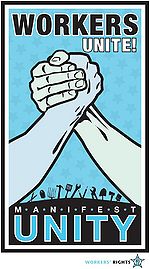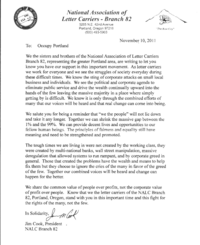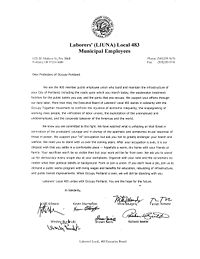Occupy Portland Labor Outreach Committee: Difference between revisions
Jump to navigation
Jump to search
WikiMaster (talk | contribs) m (→More News & Views: Can the Occupy Movement Save Labor?) |
WikiMaster (talk | contribs) m (Add cats.) |
||
| (2 intermediate revisions by the same user not shown) | |||
| Line 1: | Line 1: | ||
{{Template:CA/Assembly/Tab header}} | |||
== Labor Solidarity Committee: [[Occupy Portland Labor Outreach Committee Mission Statement|Mission Statement]] == | == Labor Solidarity Committee: [[Occupy Portland Labor Outreach Committee Mission Statement|Mission Statement]] == | ||
The purpose of the Labor Solidarity Committee is to facilitate communication and relationship building between labor and Occupy Portland. Labor and Unions are an essential part of the Occupy Movement and it is the goal of the Labor Solidarity Committee to make sure that they are included as much as possible. | The purpose of the Labor Solidarity Committee is to facilitate communication and relationship building between labor and Occupy Portland. Labor and Unions are an essential part of the Occupy Movement and it is the goal of the Labor Solidarity Committee to make sure that they are included as much as possible. | ||
| Line 101: | Line 102: | ||
* [[Portland General Strike]] | * [[Portland General Strike]] | ||
{{:CA/Global Footer}} | |||
[[Category:Community Assembly]] | |||
[[Category:Community Assembly Portal]] | |||
[[Category:Occupy Portland]] | [[Category:Occupy Portland]] | ||
[[Category:PortlandUnionWiki]] | [[Category:PortlandUnionWiki]] | ||
Latest revision as of 17:10, 4 April 2012
| Main Page | News | People’s Budget Project | Calendar | Documents | Contact | Discussion |
Labor Solidarity Committee: Mission StatementThe purpose of the Labor Solidarity Committee is to facilitate communication and relationship building between labor and Occupy Portland. Labor and Unions are an essential part of the Occupy Movement and it is the goal of the Labor Solidarity Committee to make sure that they are included as much as possible. Get InvolvedOP Labor Outreach Committee Meeting[improve] 
Purpose Need volunteers to facilitate & take notes.
HistoricalIncomplete list.
Occupy Support of Working People
Labor Support of Occupy Portland “We share the common value of people over profits, not the corporate value of profit over people. Know that we the letter carriers of the NALC Branch 82, Portland, Oregon, stand with you in this important time and this fight for the rights of the many, not the few.”  Laborers' Local 483 unites with Occupy Portland. "You are the hope for the future."
External LinksRelated Articles
More News & Views
On Strike!
Research: Social Sciences
Hostile Forces
ReferencesSee Also |
Categories:
- Community Assembly
- Community Assembly Portal
- Jobs
- Organizing
- Union Organizing
- PortlandUnionWiki
- Occupy Portland Events
- Occupy Portland Labor Outreach Committee
- Occupy Portland
- Labor unions
- Organizations
- Self organizing
- Occupy Portland Community Support
- Advocacy Groups
- Peoples’ Assembly
- Peoples’ Assembly Organizing Committee